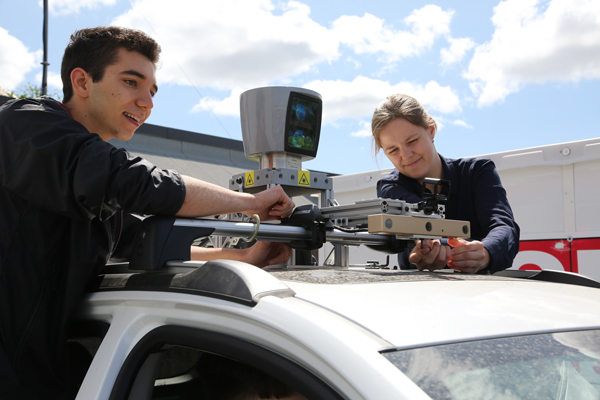
February 28th, 2018
Our society produces billions of gigabytes of data each day, from retail product barcodes to images from CCTV cameras, social media posts or data from GPS devices. Two new programs from U of T Engineering will prepare the next generation of experts to leverage this data and enhance fields as diverse as health care, finance and autonomous transportation.
The Engineering Science major in Machine Intelligence is set to receive its first students in fall 2018. Students in the new major will take a systems approach, with emphasis on the integration of both computer hardware and software systems. They will study, develop and apply algorithms that can learn and make decisions based on data, but they will also gain a deep understanding of how to clean and structure information, build mathematical models, and create computer architectures optimized for artificial intelligence applications.
“Machine learning and artificial intelligence are inherently multidisciplinary,” says Professor Deepa Kundur (ECE), chair of the Faculty’s Engineering Science program. “They require a strong technical foundation, but also the creativity and flexibility to apply techniques to a wide range of challenges. There is no traditional career path, which is why they are a perfect fit for our graduates.”
The other new offering is the MEng emphasis in Analytics, which is open to professional master’s students in chemical engineering, civil engineering, electrical and computer engineering, and mechanical and industrial engineering. Students in this program will learn techniques and strategies to translate large data sets into useful insights for sectors such as transportation, banking and health care.
Both of the new programs draw on the Faculty’s existing expertise in areas such as operations research, computational genomics and intelligent mechatronic systems. U of T Engineering researchers are already using data analytics to optimize surgical schedules, point the way toward new treatments for genetic diseases and improve the functioning of cities.
Using data from advanced sensors, they have also designed a self-driving wheelchair and a variety of autonomous drones. A team composed of undergraduate and graduate students from U of T Engineering is currently converting an electric vehicle into an autonomous one as part of the international AutoDrive competition.
The programs will also be enhanced by multidisciplinary research centres such as the Vector Institute for Artificial Intelligence and the Institute for Robotics and Mechatronics (IRM), which bring together some of the world’s top experts in these fields, both within and beyond engineering.
“We have seen very strong demand, both from interested students and from the industries that require this kind of expertise,” says Kundur. “The possibilities are truly boundless, and I am very excited to see where our graduates will take their knowledge in the years to come.”
This story originally appeared on U of T Engineering News.
More information:
Jessica MacInnis
Senior Communications Officer
The Edward S. Rogers Sr. Department of Electrical & Computer Engineering
416-978-7997; jessica.macinnis@utoronto.ca